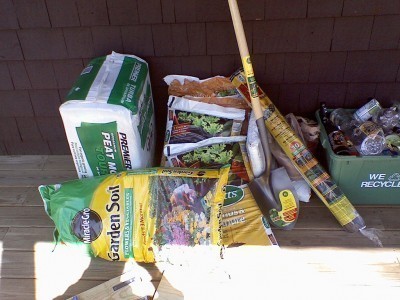






Organic gardening doesn’t require any different tools than a traditional garden. Rakes, hoes, trowels, soil forks, and shovels all are standard no matter what type of garden you grow. If you plant in raised beds, a tiller isn’t necessary, although a small one is a nice tool to have around for breaking up new ground. The difference lies in what products you use for fertilizer and pest and weed control. Let’s learn more about these organic gardening supplies.
Fertilizer supplies for an organic garden begins with compost. Adding compost to any soil type increases the nutrient value and supports healthier plants. Most organic gardeners make their own compost using kitchen and yard waste, but it can be purchased at any good garden center.
Ground cover crops can also be planted during the fallow season to be tilled into the soil in spring and can add many nutrients back into the garden plot. Earthworms introduced into the garden can facilitate keeping oxygen in the soil and their castings add more nutrients.
Organic fertilizers can be purchased for extreme problems, but with good compost this is rarely necessary. For extremely poor soil, use of an organic fertilizer the first year may help build the nutrient value of the soil until compost can completely fulfill that role.
Organic weed control is generally done the old fashioned way – by hand pulling. Any weeds pulled are added to the compost bin for the next year.
Most organic farmers mulch their gardens heavily to keep the weed population down. A simple, inexpensive way to make mulch is to save old newspapers and magazines and use a shredder to cut the paper into small strips. Print publications are now mostly printed with soy ink and are safe to use, just be sure to remove any staples.
Organic pine needles and hay are other options.
Finding or using pest control supplies for an organic garden can be a big issue for gardeners, but there are many ways to naturally control the bug, slug, and caterpillar population.
The supplies for an organic garden need not be any more expensive than those for a traditional garden. Look for ways to improvise the more expensive equipment and don’t believe everything the salesman at the garden center tries to convince you is needed. Do searches on the Internet to find natural solutions for any specific problems that may arise. Oftentimes, the answer is within your reach and is simple to make.
Copyright © www.100flowers.win Botanic Garden All Rights Reserved